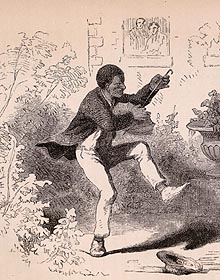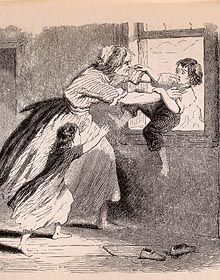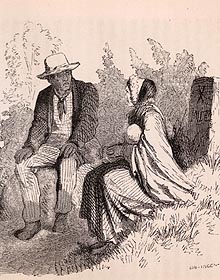 |
Contemporary readers would have recognized the recipient of these letters. "Major Jones of
Pineville, Georgia," was the fictional creation of William Tappan Thompson, a comic naïf whose
mis-spelled letters about
life in "the Old South-West" during the 1840s appeared first in newspapers, and then were reprinted in
popular volumes like Major Jones' Courtship (1843). It's not clear, however, who Ebenezer
Starnes was. There was a Georgia Attorney General of that name from 1834-1840 who could have
known Thompson, and decided to create a cousin for Major Jones as a way to give his letters
from England more visiblity.
It is easier to identify Starnes' agenda. The first six letters in his book are dated July -
November, 1851, and describe Dr. Pleasant Jones' trip to England, to see the Great Exhibition in the Crystal
Palace. Letter 7 is dated 1 June 1853. In the interim Stowe's novel has been published, and become an even
bigger best-seller in England than in the U.S. Its reception in Britain, and especially the abolitionist
message "from the Christian ladies of England to their Sisters in America," provoke Dr. Jones to write 38
more letters in a new spirit.
|
Now he has nothing pleasant to say about England. His admiration for the
Crystal Palace yields to an angry determination to prove that people who live in glass houses shouldn't
throw stones -- i.e. that given the amount of "social profligacy" (p. 21) in their society, the English
have no
business attacking the Slave States. At tedious length, he quotes British media to show how there
is "more of suffering, destitution, crime, brutality . . . cruelty and oppression," and so on, in England
than in the American South. "Uncle Tom" is only mentioned at intervals, but what he sees as England's hypocritical
sympathy with this fictional figure serves regularly to punctuate his indictment of social
realities.
The last letter is dated mid-1854. It's also not clear why they were not published until 1860. But
one thing the volume does allow us to see is how much Stowe's novel may have affected the relationship
between the Slave South and Great Britain. Not long after this book was published, the Confederate States
of America would be looking for recognition from England; without Uncle Tom's Cabin the gap between
the two societies might have been much less wide.
|



